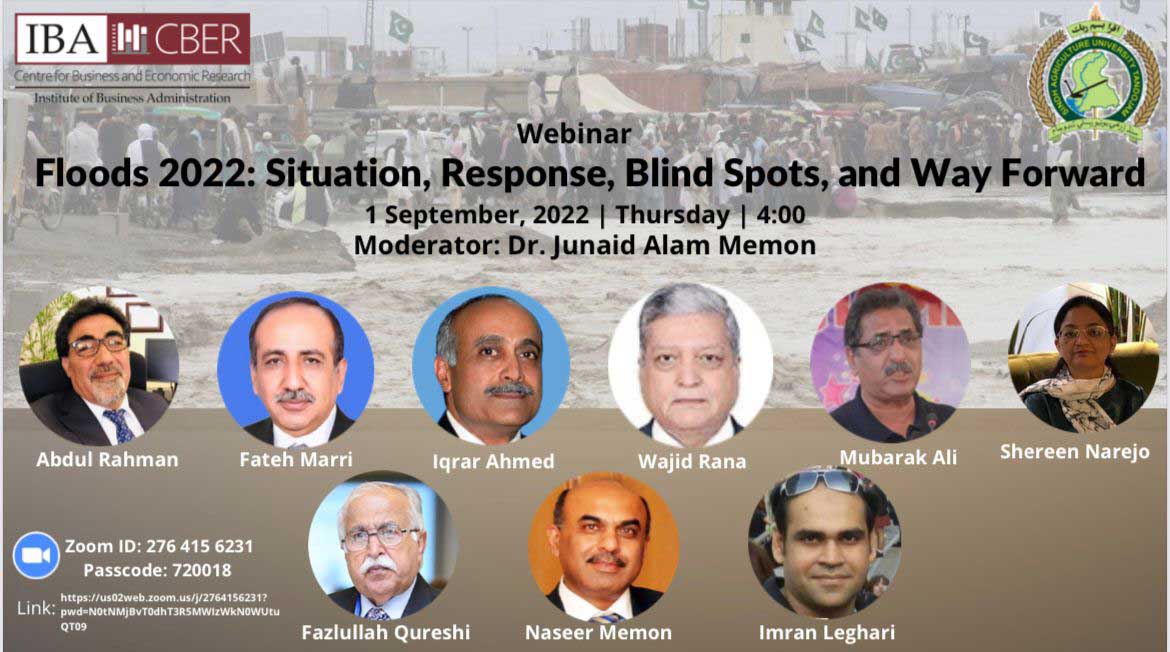IBA Karachi and Sindh Agriculture University organized a webinar on floods 2022 and the way forward
September 01, 2022: Centre for Business and Economic Research (CBER), Institute of Business Administration Karachi and Sindh Agriculture University, Tandojam, jointly organized a special webinar titled ‘Floods 2022: Situation, Response, Blind Spots, and Way Forward’. Dr. Junaid Alam Memon, Director CBER, moderated the webinar and set the context by introducing the speakers.
Dr. Fateh Marri, Vice Chancellor, Sindh Agriculture University, Tandojam, provided the status for the current situation of the disaster and emphasized the loss of economic activity, future productions, missed opportunities, and the limited capacity of human resources. He stated that Pakistani universities are not only engaged in flood relief operations but are also committed to provide policy advises, technical assistance and setup a solution-oriented research agenda.
Dr. Iqrar Ahmed Khan, Vice Chancellor, University of Agriculture, Faisalabad, highlighted that drainage is the main issue for Sindh province due to its location and it requires attention. He also suggested that while providing food items to affected households, the feed for their livestock may also be part of their relief package. He hoped that the farmers would be able to cultivate wheat if lands become ready otherwise oilseeds are to be planned. Dr. Mubarik Ahmed from TDAP confirmed that the agriculture losses to the country are tremendous, and among other crops, 80% of the cotton in Sindh and 100% of cotton crop in Baluchistan are affected. He warned that the disaster would result in reduced export and increase our dependence on food and seed imports. Dr. Abdul Rehman, Pro Vice Chancellor, BUTIMs, Quetta talked about damages to cities and pointed towards increased incidences of domestic violence, child labor, and various forms of harassment that often slip from disaster response initiatives. Mr. Naseer Memon, Country Representative of Asian Disaster Preparedness Center, Pakistan, pointed out that the encroachment in the rural and urban areas is the underlying cause of flood-induced disaster and held weak institutional capacity and lack of political will is responsible for that. Dr. Shereen Narejo, Former Chairperson of Planning, and Development Department, Sindh, stated that the issue of population growth is often missed in climate discourse and emphasized that disaster is our collective problem and requires collective action. She urged that the society has to take required steps and academia and others have to play their due role. Mr. Fazullilah Qureshi, Former Federal Secretary, Planning Commission, pointed out that flood may be a national catastrophe but of different magnitude for different provinces and suggested that the Sindh is worst hit due to faulty projects such LBOD. He said that a minimum amount of Rs. 400 billion should be allocated for flood recovery for Sindh by federal and provincial governments by reducing unnecessary expenditures. He also proposed to have an oversight body including government, academia and civil society for flood recovery works and funds management.
In his closing remarks, Dr. Mukhtar Ahmed, Chairman, Higher Education Commission (HEC) informed that HEC has created a sizable research fund specifically to support evidence-based and solution-oriented research to address current and future natural disasters. He said that the higher education sector is fully aware of the situation and public and private sector universities are playing their role in relief work. The webinar was also attended by Dr. Qamar u Zaman, Vice Chancellor, Arid Agriculture University, Rawalpindi; and Dr. Robina Wihaj, Food and Agriculture Organization, United Nations.

